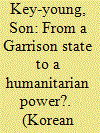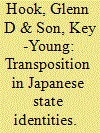| Srl | Item |
| 1 |
ID:
108584


|
|
|
|
|
| Publication |
2011.
|
| Summary/Abstract |
This article examines the transformation of South Korea's international security
identity from an anti-communist garrison state to a humanitarian power. Given the
frequency of its choice of non-combat troops mobilized as part of alliance obligations
and UN peacekeeping operations, South Korea can be classified as a state that
has made the dispatch of non-combat troops a norm in the case of overseas power
projection following the end of the Cold War. It argues that South Korea's normative
preference of dispatching non-combat forces on humanitarian and peacekeeping
missions has played a constitutive role in crafting the state as an international
humanitarian power, though in the initial stage of identity transformation. Given its
rise as an economic powerhouse and its international security stature as a middle
power, South Korea's transformation of security identities holds strategic significance,
not only for those on the Korean peninsula, but also for the United States and many
other countries in the world. The article first analyzes South Korea's garrison state
identity of the Cold War period and the emerging humanitarian power identity by
focusing on a shift in institutions and public opinions regarding the country's overseas
power projection. It concludes by critically reviewing South Korea's international
humanitarian activities and making a number of suggestions as to how it might
emerge as a full-fledged international humanitarian power
|
|
|
|
|
|
|
|
|
|
|
|
|
|
|
|
| 2 |
ID:
119067


|
|
|
|
|
| Publication |
2013.
|
| Summary/Abstract |
This article aims to illustrate the trajectory of Japan's security identity transposition. As one of the catalysts in identity transposition, it focuses on the constitutive roles of norms regulating Japan's overseas dispatches of the Self-Defense Forces (SDF). Whilst keeping the identities of 'a peace state' and 'a civilian power', the authors argue that Japan has crafted a new security identity after the end of the cold war and the 9/11 terrorist attacks-namely, 'an international humanitarian power'. As evidence of this transposition, the authors illustrate a dramatic increase in the number of overseas SDF dispatches on humanitarian missions, and the shift of domestic and foreign responses to it. The authors note that Japan has been on the road to remilitarisation and internationalisation during the past four decades through the enactments of laws for overseas SDF dispatches, the general public's shift of attitude on the SDF's roles, the evolution of the alliance in a more operational direction, and the creation of threats from North Korea and China. Lastly, the authors argue that there is still a long way to go before Japan emerges as a normal state because of the presence of many domestic and structural barriers, especially multiple identities defining the Japanese state.
|
|
|
|
|
|
|
|
|
|
|
|
|
|
|
|